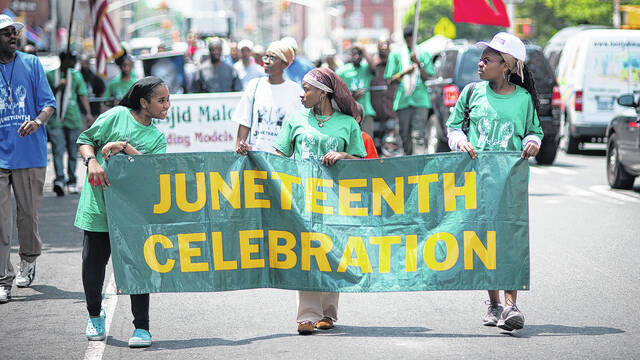PICKENS COUNTY — This past Sunday, many Americans came together to observe Juneteenth, a holiday occurring every year on June 19 to commemorate the emancipation of enslaved African Americans in the United States.
However, a 2021 Gallup survey shows that more than 60% of Americans say they know “nothing at all” or “only a little bit” about this historic celebration.
While many readers will know the reason behind the festivities, some may wonder: “What is the significance behind the date?” or “What led to Juneteenth finally being recognized as a federal holiday just last year?”
The story begins on Jan. 1, 1863 when then president Abraham Lincoln issued the Emancipation Proclamation, decreeing the freedom of all enslaved people in the Confederacy. However, news was slow to arrive in Texas, being the most remote state in the former confederacy and having a low presence of Union troops as the Civil War ended.
Many slaveholders had migrated to Texas from other confederate states to avoid the fighting and historians estimate that by 1865 there were around 250,000 enslaved people residing in the Lone Star state. On the morning of June 19, 1865, Union Major General Gordon Granger arrived in Galveston, Texas, under orders to enforce the proclamation and oversee reconstruction.
According to historical accounts, written notices referred to as General Order No. 3 were quickly posted in public places informing Texans that all slaves were now free.
As a result, June 19 became a day of celebration and in 1866 the first Juneteenth holiday was held in Texas.
Initially referred to as “Jubilee Day,” the gathering was used as a political rally to give voting instructions to the newly freed Black Americans. However, because of the state-sponsored segregation of facilities, Black Americans ran into difficulties finding parks to hold their celebration. In response, Black leaders started raising money to purchase land, leading to the creation of historic parks such as Emancipation Park in Houston and Booker T. Washington Park in Limestone County. Starting in the early 1890s, the Black community began referring to Jubilee Day as “Juneteenth,” although its origins are unclear.
Despite the Great Depression making it difficult for many Black Americans to take the day off to celebrate, in 1936 an estimated 150,000 to 200,000 people gathered to observe the holiday at the Texas State Fair in Dallas.
From 1940 through 1970, the second wave of the Great Migration helped spread Juneteenth across the nation.
Historian Isabel Wilkerson wrote: “The people from Texas took Juneteenth day to Los Angeles, Oakland, and other places they went.”
By the late 1980s, major celebrations were cropping up in California, Wisconsin, Illinois, Georgia and Washington D.C., according to published accounts.
Texas became the first state to make Juneteenth a paid day off in 1980 and by the early 2000s large pushes were being made to recognize it as a federal holiday. Finally, after passing through both the Senate and House with little to no opposition, on June 17, 2021 the Juneteenth National Independence Day Act was signed by President Joe Biden, officially recognizing Juneteenth as a national holiday.
The story of Juneteenth is one of great resilience and celebration and one that is truly emblematic of being an American through and through.


Leave a Reply